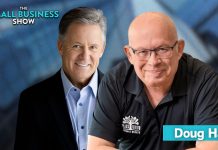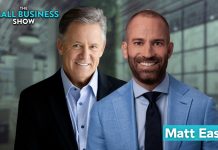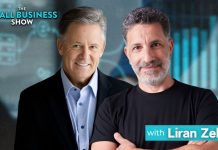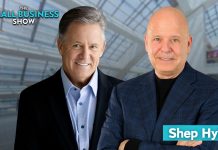Energy consumption, costs, and efficiencies are at the forefront of everyone’s mind. I’m joined today by a true pioneer in the energy consumption solution space. On this week’s episode of The Playbook, host Mark Collier, business consultant for the UGA Small Business Development Center, is joined by Reginald Parker, the Founder and President of Optimal Technology Corporation. Today, he shares some of the ways his company is delivering real value and solutions to the clients that he serves.
Transcription:
Mark Collier:
Welcome into the playbook, Reginald.
Dr. Reginald Parker:
Thank you. Thank you for having me.
Mark Collier:
All right. Listen, I spent 15 years as a construction project manager on large commercials project, so energy consumption is a big deal, and it’s at the forefront of every business owner and developer’s mind. So, kind of, share with me a little bit about your background and your company.
Dr. Reginald Parker:
Okay. Well, I am an engineer. I got my bachelor’s from MIT, Georgia Tech, Ph.D., then an MBA from Florida State. So I learned to calculate very well, then learned business. I’ve worked at some top-tier companies, Boston Consulting Group, Dow Chemical.
Mark Collier:
I’m very familiar with those.
Dr. Reginald Parker:
Did academics, but after a while, I said, you know, I want to make an impact.
Mark Collier:
Okay.
Dr. Reginald Parker:
And so I went into entrepreneurialism, and I’ve been there since 2005.
Mark Collier:
Okay.
Dr. Reginald Parker:
And what I was looking to do is to help in energy poverty.
Mark Collier:
What is energy poverty from your perspective?
Dr. Reginald Parker:
There’s 1.1 billion people on earth who have no access to power.
Mark Collier:
Okay.
Dr. Reginald Parker:
Outside of those, there are people who have energy, but the costs are high.
Mark Collier:
Sure.
Dr. Reginald Parker:
Now, there’s dozens of countries where the costs of electricity are five times that of the US, and they’re developing countries.
Mark Collier:
Okay.
Dr. Reginald Parker:
It’s hard to develop into a strong, robust economy when you have that big of a hurdle.
Mark Collier:
Absolutely.
Dr. Reginald Parker:
And that’s a form of energy, poverty.
Mark Collier:
Okay.
Dr. Reginald Parker:
And then there are people who have good cost energy, but it’s killing them.
Mark Collier:
Okay. Give an example of that.
Dr. Reginald Parker:
You’ll find that the rates of lung cancer and things of that nature within certain populations are higher. Harvard just sent out a study in February, says 20% of deaths in the world are because of fossil fuel consumption.
Mark Collier:
Wow.
Dr. Reginald Parker:
So the problem with energy is that it advances the economy but comes at a high cost if not done correctly.
Mark Collier:
Okay. All right. And that’s kind of where your company steps in, to kind of provide those advanced solutions to mitigate those risks?
Dr. Reginald Parker:
Yeah. We’re looking at ways of reducing the $1.4 trillion of energy waste each year, reducing the deaths, and reducing the number of people who are energy poor.
Mark Collier:
All right. So differentiation is the holy grail of all business models. So kind of share with me what differentiates your company from some of the other competitive offerings out in the marketplace.
Dr. Reginald Parker:
Well, what we do is look at the whole energy need of the customer.
Mark Collier:
All right.
Dr. Reginald Parker:
All right.
Mark Collier:
So, that begins with an assessment then.
Dr. Reginald Parker:
Yep.
Mark Collier:
Okay.
Dr. Reginald Parker:
So as an example, we’re doing a project with National Sports Center with our partner AESG in Bermuda.
Mark Collier:
All right.
Dr. Reginald Parker:
They are spending $49,000 a month in electricity costs.
Mark Collier:
$49,000 a month in one facility?
Dr. Reginald Parker:
One facility.
Mark Collier:
Yeah. That’s a lot of money.
Dr. Reginald Parker:
And most of the fuel or the energy comes from diesel fuel.
Mark Collier:
Okay.
Dr. Reginald Parker:
So not only are they spending a lot, they’re creating a lot of carbon dioxide and greenhouse gases.
Mark Collier:
Sure.
Dr. Reginald Parker:
We figured out that the biggest cost center was a inefficient heat pump. So we got a high-efficiency heat pump.
Mark Collier:
Okay.
Dr. Reginald Parker:
We are building a one-acre solar canopy.
Mark Collier:
Okay.
Dr. Reginald Parker:
So, it’ll have dual-use. Cars can park under it, get shade, but also it’s generating electricity and then a microgrid to control how the power flows throughout the system.
Mark Collier:
Very interesting.
Dr. Reginald Parker:
That reduced their costs from $49,000 to $28,000, a 43% reduction in cost.
Mark Collier:
That’s phenomenal. That’s phenomenal. I mean, that’s something that you can set that baseline and kind of replicate it around to your other customers. All right. Well, that’s a great achievement.
Dr. Reginald Parker:
Saving money and saving the planet at the same time.
Mark Collier:
Double duty, right?
Dr. Reginald Parker:
Yeah.
Mark Collier:
All right. So I’ve read your tagline and your website, “Your electrons are better than theirs.” Tell me what that means and why do you say that?
Dr. Reginald Parker:
Well, I always make this joke. An electron doesn’t know who his daddy is. You don’t know whether or not that piece of electricity comes from, you know, coal, or it comes from solar, or it comes from wind. You just want the electricity when you turn it on.
Mark Collier:
Sure.
Dr. Reginald Parker:
But you don’t want the generator of that electricity to kill you.
Mark Collier:
No, you don’t want that.
Dr. Reginald Parker:
So when I say our electrons are better than yours, it’s a playoff of a popular song. But what we’re saying is that what we want to do is having electrons that not only give you light but also give you light in your heart.
Mark Collier:
Okay. I like that. I like that a lot. So, as you grow and scale your business, you’ve been entertaining investors, I’ve heard.
Dr. Reginald Parker:
Yeah.
Mark Collier:
So have you been well received by investors, and what’s been some of the feedback you’ve been hearing out here?
Dr. Reginald Parker:
There’s two roadblocks that I’ve seen in the general community.
Mark Collier:
Okay.
Dr. Reginald Parker:
But, you know, I tend to try to navigate to people who are interested in what I’m interested in, my tribe.
Mark Collier:
Sure. [Crosstalk 00:06:12].
Dr. Reginald Parker:
I don’t try to go to everybody. I mean, I’m an African American. 1% of all venture capital go to us.
Mark Collier:
Yeah. That’s right. That’s right.
Dr. Reginald Parker:
Regardless of our capability.
Mark Collier:
Right.
Dr. Reginald Parker:
Regardless of the number, we’re underrepresented and underestimated as far as that’s concerned. So I’m not necessarily looking for everybody because everybody’s not looking for me.
Mark Collier:
Makes sense.
Dr. Reginald Parker:
The second thing is that Silicon Valley and the other places that fund are looking for easier models of just straight digital. We do what the customer needs. We have a digital. We have an AIML.
Mark Collier:
AIML. You got to know that. Acronyms, I don’t know what that means.
Dr. Reginald Parker:
Artificial Intelligence Machine Learning.
Mark Collier:
All right. Very good. Thank you.
Dr. Reginald Parker:
It’s a device that we put right at your junction box, your breaker box. It then senses your electricity. We send it up to the cloud. We do our machine learning our artificial intelligence and figure out just how you’re using energy and tell you things. Like, you need to change your air filter.
Mark Collier:
Okay.
Dr. Reginald Parker:
You know. Your roof refrigerator is going to go out in the next week or two.
Mark Collier:
Okay. Okay.
Dr. Reginald Parker:
You know? Or we can shut down these lights in these particular times because you’re not really using them, based on our sensors. So, there are ways of actually cutting your electricity costs, and you’re not thinking about it, but the AI, the artificial intelligence, is.
Mark Collier:
Yep.
Dr. Reginald Parker:
So that’s one of the things.
Mark Collier:
Okay.
Dr. Reginald Parker:
And the venture capital community loves that. But when I came up with a new solar panel that deployed 21 times faster than anybody else’s, took up 40%, less space, and produced 90% more electricity. It was hardware. And they said, “Hardware is hard.” Well, so is software if you don’t know it. So you know, sometimes they are open to the innovation and sometimes they’re not. So it hasn’t been a home run, even though the innovation is off the charts, differentiated.
Mark Collier:
Okay. All right. I’m going to guess that the reason there’s a lag period there is because they don’t understand it. I mean, a lot of people, if they can’t get their arms around a concept, it’s tough for them to, kind of, be an advocate for it. Am I a little bit off there, or?
Dr. Reginald Parker:
I’m a former professor, so I can make sure that it’s understood. The thing is, is that a lot of Silicon Valley is, give me an app.
Mark Collier:
Okay.
Dr. Reginald Parker:
You know, I don’t want something real that I can touch.
Mark Collier:
Sure.
Dr. Reginald Parker:
Because you can mess it up if you don’t know what you’re doing. Well, I do. And I understand that they have to be good stewards of their money and they have to, you know?
Mark Collier:
Sure.
Dr. Reginald Parker:
But it is harder nowadays to find venture capitalists who have thesis that include hardware.
Mark Collier:
Now these solutions, these solar solutions, are they for commercial and residential applications?
Dr. Reginald Parker:
More commercial and utility-scale.
Mark Collier:
More commercial. Okay. Very good. All right.
Dr. Reginald Parker:
All right.
Mark Collier:
So much larger infrastructure.
Dr. Reginald Parker:
Yeah. Part of the infrastructure bill is for that. The other piece of the bill that doesn’t get as much air is this, for the communities who are hardest hit by climate change, who haven’t actually caused as much of the climate change.
Mark Collier:
Sure.
Dr. Reginald Parker:
They’re making sure that at least 40%, it’s called Justice40.
Mark Collier:
Okay.
Dr. Reginald Parker:
40% of the climate change money goes to those type of communities.
Mark Collier:
Very interesting. So I guess they’re shifting that money to underserved communities in hopes of improving and upgrading that infrastructure. Correct?
Dr. Reginald Parker:
Right. Because that’s usually the infrastructure, as we talked about earlier, from energy poverty that need it.
Mark Collier:
Sure. All right. Very good. So what’s the best way to contact you?
Dr. Reginald Parker:
Well, if you need anything, we tell you, GetOptimalTech.com or on our social GetOptimalTech.
Mark Collier:
GetOptimalTech.
Dr. Reginald Parker:
Yes.
Mark Collier:
All right, man. So that’s how to reach you. Dr. Reginald Parker, Founder, and President of Optimal Technology Corporation. I want to thank you for taking the time to come in today and kind of detail some of the great work that you’re doing, man, on the cusp of not only helping companies save money but also helping save the planet. And I think those are worthwhile initiatives, and I wish you the best of luck.
Dr. Reginald Parker:
Thank you very much for your time.
The Atlanta Small Business Network, from start-up to success, we are your go-to resource for small business news, expert advice, information, and event coverage.
While you’re here, don’t forget to subscribe to our email newsletter for all the latest business news know-how from Atlanta Small Business Network.







